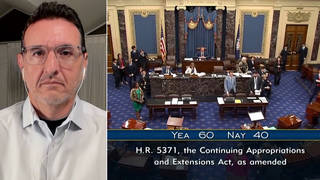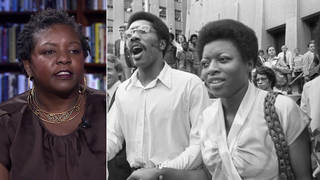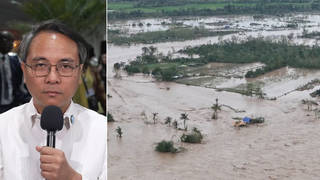HeadlinesSeptember 27, 2012
Anti-Austerity Protests Continue in Greece, Spain
Anti-austerity protests continued to rage in Greece and Spain as both countries brace for fresh cuts. Greek leaders are meeting today over a $15 billion austerity plan aimed at persuading international lenders to release tens of billions in aid. Protests erupted across Greece Wednesday during the first general strike since the new government took power in June. In the Greek capital of Athens, tens of thousands of people took to the streets, some hurling firebombs, breaking windows and setting fire to debris. Meanwhile, Spain is expected to unveil massive cuts today in its budget plan for next year. On Wednesday, protesters surrounded the Spanish Parliament in the second day of an “Occupy Congress” action to protest austerity and the loss of public confidence in elected leaders.
Activists Claim More Than 300 Killed in Syria; U.N. Warns of 700,000 Refugees
Opposition activists are claiming more than 300 people were killed in Syria’s violence on Wednesday, the highest single-day toll of the 18-month-old conflict to date. The killings include an alleged massacre in the town of Dhiyabia, where some 40 people were reportedly slain. Video released by opposition activists shows rows of bloodied corpses covered in blankets. The United Nations’ refugee agency meanwhile is warning up to 700,000 people may wind up fleeing Syria by the end of the year, far greater than the previous estimate. Some 294,000 refugees have already left Syria this year.
Egyptian President Opposes Syria Intervention
In an address to the United Nations General Assembly in New York City, Egyptian President Mohamed Morsi criticized the regime of Bashar al-Assad but warned against international intervention in Syria.
Egyptian President Mohamed Morsi: “Egypt is committed to pursuing the sincere efforts it has been making to put an end to the tragedy in Syria, within an Arab, regional and international framework, a framework that preserves the unity of this brotherly state and will involve all sections of the Syrian people without discrimination based on race, religion or sect. It would spare Syria the danger of foreign military intervention, which we oppose, of course.”
Ahmadinejad Says “Uncivilized Zionists” Threaten Iran
In his final appearance before the U.N. General Assembly before his term expires in nine months, Iranian President Mahmoud Ahmadinejad gave a more subdued speech than in previous years. Addressing the threat of an Israeli military attack on Iran, Ahmadinejad referred to Israel as “uncivilized Zionists.”
Iranian President Mahmoud Ahmadinejad: “Arms race and intimidation by nuclear weapons and weapons of mass destruction by the hegemonic powers have become prevalent. Testing new generations of ultra-modern weaponry and the pledge to disclose these armaments on due time is now being used as a new language of threat against nations to coerce them into accepting a new era of hegemony. Continued threat by the uncivilized Zionists to resort to military action against our great nation is a clear example of this bitter reality.”
The United States, Canadian and Israeli delegations at the United Nations all skipped Ahmadinejad’s speech. Israeli Prime Minister Benjamin Netanyahu is expected to address the General Assembly today.
Obama, Romney Spar on China Trade in Ohio
President Obama and Republican challenger Mitt Romney each spent Wednesday campaigning in the battleground state of Ohio, a key prize in the battle to win the November election. Both candidates appealed to voters by attacking the other’s record on China, with Romney saying he will stop the country from taking U.S. jobs.
Mitt Romney: “One of the nations that has cheated over the years has been China. They have artificially held down the value of their currency. And by doing that, the prices of their products are artificially low. And when their prices are low and then they compete with our manufacturers, our guys go out of business and people lose jobs. And that’s why one thing I will do from day one is label China a currency manipulator. They must not steal jobs in an unfair way.”
Romney’s comments come days after his tax returns showed his trust has invested in a Chinese oil company doing business with Iran. President Obama criticized Romney’s comments on China.
President Obama: “He’s been talking tough on China. He says he’s going to take the fight to them, he’s going to go after these cheaters. And I’ve got to admit, that message is the better — is better than what he’s actually done about this thing. It sounds better than talking about all the years he spent profiting from companies that sent our jobs to China.”
UC Davis Reaches $1 Million Settlement over Pepper-Spraying of Student Protesters
The University of California has reached a $1 million settlement with 21 protesters at UC Davis who were pepper-sprayed at a student demonstration last November. The incident sparked a nationwide outcry after video was posted online showing a campus police lieutenant repeatedly pepper-spraying students in the face from only a few feet away as they sat on the ground. The settlement includes a $30,000 payout to each of those who were sprayed, attorneys’ fees, and a formal apology from UC Davis Chancellor Linda Katehi.
U.S. Army Tested Chemicals on Cities, Low-Income Residents
Newly disclosed documents have revealed details on how the U.S. military carried out testing of chemicals on major U.S. cities during the 1950s and 1960s. Sociologist Lisa Martino-Taylor of St. Louis Community College says zinc cadmium sulfide was sprayed in several cities without residents’ knowledge. The most densely sprayed area appears to have been a housing complex for low-income people in St. Louis.
Lisa Martino-Taylor: “It was pretty shocking, the level of duplicity and secrecy. Clearly they went to great lengths to deceive people. There’s a lot of evidence that indicates that people in St. Louis in the city, particularly in minority communities, were subjected to military tests that was connected to a larger radiological weapons development and testing project.”
Ex-Guatemalan Commander Ordered to Stand Trial in U.S.
A former Guatemalan army commander accused in a 1982 massacre has been ordered to stand trial on charges he lied about his past to obtain U.S. citizenship. Jorge Sosa was allegedly a commanding officer during the notorious Dos Erres killings, when a U.S.-backed death squad killed more than 200 villagers, including women and children who were strangled, beaten with sledgehammers, and thrown down a well. Sosa was extradited to the United States from Canada last week. If convicted, he could be extradited back to Guatemala to face charges in connection with the massacre after he completes his sentence.
Study: Global Warming Could Claim 100 Million Lives by 2030
A study commissioned by 20 developing countries is warning more than 100 million people will die by 2030 if the world fails to take on global warming. The Climate Vulnerable Forum says air pollution, hunger and disease caused by climate change and the consumption of fossil fuels will kill five million people per year. More than 90 percent of the estimated deaths would occur in developing countries. The report also warns global warming threatens to seriously contract the global economy over the next decade.
U.S. Eases Ban on Burmese Imports
The Obama administration has taken new steps to loosen sanctions on Burma following a series of reforms by the ruling junta. In a meeting at the U.N. General Assembly, Secretary of State Hillary Clinton told Burmese President Thein Sein that the United States will ease its ban on imports from Burma.
Secretary of State Hillary Clinton: “We have watched as you and your government have continued the steady process of reform, and we’ve been pleased to respond with specific steps that recognize the government’s efforts and encourage further reform. And in recognition of the continued progress toward reform and in response to requests from both the government and the opposition, the United States is taking the next step in normalizing our commercial relationship.”
NFL, Refs Strike Deal to End Lockout
The National Football League has reached an agreement to end a labor dispute with its locked-out, unionized referees. The NFL rushed to make the deal after a botched call by replacement officials decided the outcome of a nationally televised game Monday night, prompting widespread outrage from fans, journalists and the league’s teams.
2012 Right Livelihood Awards Announced in Sweden
In Sweden, the 2012 Right Livelihood Awards have been announced to four recipients: Turkish environmental activist Hayrettin Karaca “for a lifetime of tireless advocacy and support for the protection and stewardship of our natural world”; Afghan women’s activist Sima Samar “for her longstanding and courageous dedication to human rights, especially the rights of women”; the U.S. scholar Gene Sharp “for developing and articulating the core principles and strategies of nonviolent resistance and supporting their practical implementation in conflict areas around the world”; and to Britain’s Campaign Against Arms Trade “for their innovative and effective campaigning against the global trade in arms.” Handed out annually, the Right Livelihood Awards are widely known as the “alternative Nobel Prize.”
Most popular
- 1
- 2
- 3
- 4
Non-commercial news needs your support
Please do your part today.










Media Options